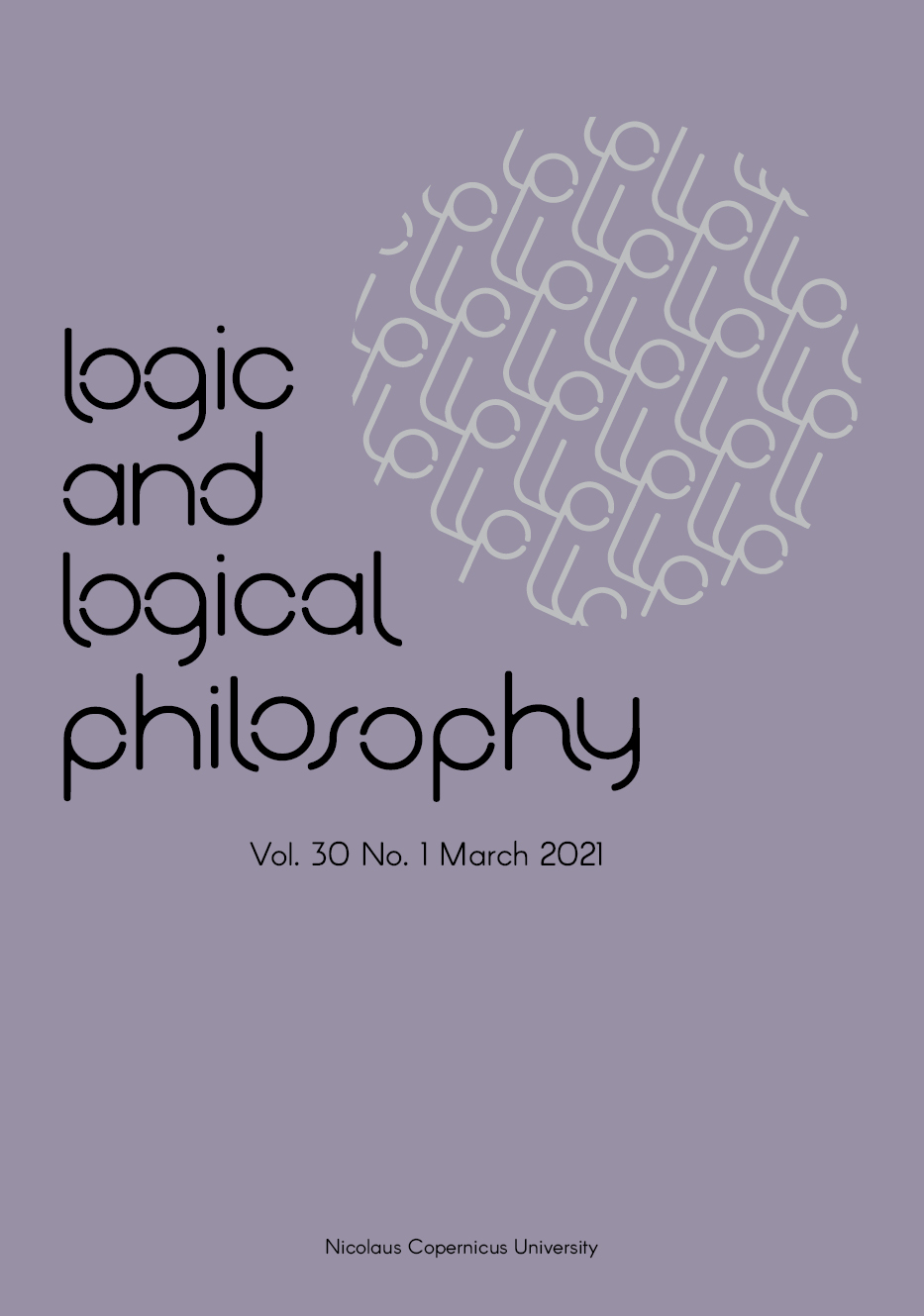Disjoint Logics
DOI:
https://doi.org/10.12775/LLP.2020.014Słowa kluczowe
disjoint logic, three-valued logics, substructural logics, epistemic commitments, permeabilityAbstrakt
We will present all the mixed and impure disjoint three-valued logics based on the Strong Kleene schema. Some, but not all of them, are (inferentially) empty logics, while one of them is trivial. We will compare them regarding their relative strength. We will also provide a recipe for building philosophical interpretations for each of these logics, and show why the kind of permeability that characterises them is not such a bad feature. Finally, we will present a three-side sequent system for most of these logics.
Bibliografia
Avron, A., “Simple consequence relations”, Information and Computation 92, 1 (1991): 105–139. DOI: http://dx.doi.org/10.1016/0890-5401(91)90023-U
Barrio, Eduardo , Federico Pailos and Damian Szmuc, “A paraconsistent route to semantic closure”, Logic Journal of the IGPL 25, 4 (2017): 387–407. DOI: http://dx.doi.org/10.1093/jigpal/jzx009
Berardi, S., and M. Matsuta, “Positive arithmetic without exchange is a subclassical logic”, Chapter 18 in Z. Shao (ed.), Programming Languages and Systems. APLAS 2007, volume 4807 of “Lecture Notes in Computer Science”, Springer, 2007. DOI: http://dx.doi.org/10.1007/978-3-540-76637-7_18
Cadoli, M., and M. Schaerf, “A survey of complexity results for non-monotonic logics”, Journal of Logic Programming 17 (1993): 127–160. DOI: http://dx.doi.org/10.1016/0743-1066(93)90029-G
Chemlá, Emmanuel, and Paul Egré, “Suszko-problem: mixed consequence and compositionality”, Review of Symbolic Logic 2017. DOI: http://dx.doi.org/10.1017/S1755020318000503
Chemlá, Emmanuel, Paul Egré and Benjamin Spector, “Characterizing logical consequence in many-valued logics”, Journal of Logic and Computation (2017). DOI: http://dx.doi.org/10.1093/logcom/exx001
Cobreros, Pablo, Paul Egré, David Ripley, and Robert van Rooij, “Tolerant, classical, strict”, Journal of Philosophical Logic 41, 2 (2012): 347–385. DOI: http://dx.doi.org/10.1007/s10992-010-9165-z
Cobreros, Pablo, Paul Egré, David Ripley and Robert Van Rooij, “Reaching transparent truth”, Mind 122, 488 (2014): 841–866. DOI: http://dx.doi.org/10.1093/mind/fzt110
Cook, Roy T., ‘What’s wrong with tonk (?)”, Journal of Philosophical Logic 34, 2 (2005): 217–226. https://www.jstor.org/stable/30226839
Da Ré, Bruno, “Structural weakening and paradoxes”. Manuscript.
De, Michael, and Hitoshi Omori, “Classical negation and expansions of Belnap–Ddunn logic”, Studia Logica 103, 4 (2015): 825–851. DOI: http://dx.doi.org/10.1007/s11225-014-9595-7
Field, H., “What is the normative role of logic”, Proceedings of the Aristotelian Society, Suplementary Volumes 83: 251–268. https://www.jstor.org/stable/20619138
Frankowski, Szymon, “Formalization of a plausible inference”, Bulletin of the Section of Logic 33, 1 (2004): 41–52.
French, Rohan, “Structural reflexivity and the paradoxes of self-reference”, Ergo 3, 5 (2016): 113–131. DOI: http://dx.doi.org/10.3998/ergo.12405314.0003.005
Gabbay, Dov M., Labelled Deductive Systems, Oxford University Press, Oxford, 1996.
Halln¨ s, L., “Partial inductive definitions”, Theoretical Computer Science 87, 1 (1991): 115–142. DOI: http://dx.doi.org/10.1016/S0304-3975(06)80007-1
Halln¨ s, L., and P. Schroeder-Heister, “A proof-theoretic approach to logic programming II: Programs as definitions”, Journal of Logic and Computation 1, 5 (1991): 635–660. DOI: http://dx.doi.org/10.1093/logcom/1.5.635
Horty, J.F., “Nonmonotonic logic”, Chapter 15 in L. Goble (ed.), The Blackwell Guide to Philosophical Logic, Blackwell, 2001. DOI: http://dx.doi.org/10.1002/9781405164801.ch15
Kawaguchi, Watari O., and M. Miyakoshi, “Fuzzy logics and substructural logics without exchange”, Proceedings of the Joint 4th Conference of the European Society for Fuzzy Logic and Technology and the 11th Rencontres Francophones sur la Logique Floue et ses Applications, 2005.
Labukt, I., “Is logic distinctively normative?”, Erkenntnis (2019). DOI: http://dx.doi.org/10.1007/s10670-019-00142-1
Lukaszewicz, W., Non-Monotonic Reasoning, Ellis-Horwood, West Sussex, England, 1990.
MacFarlane, J., “In what sense (if any) is logic normative for thought?” (2004), Online draft. https://fitelson.org/epistemology/macfarlane_2004.pdf
Makinson, D., Bridges from Classical to Nonmonotonic Logic, College Publications, 2005.
Malinowski, Grzegorz, “Q-consequence operation”, Reports on Mathematical Logic 24 (1990): 49–59.
Malinowski, Grzegorz, “Kleene logic and inference”, Bulletin of the Section of Logic 43, 1/2 (2014): 43–52
Ripley, David, “Conservatively extending classical logic with transparent truth”, The Review of Symbolic Logic 5, 2 (2012): 354–378. DOI: http://dx.doi.org/10.1017/S1755020312000056
Ripley, David, “Paradoxes and failures of cut”, Australasian Journal of Philosophy 91, 1 (2013): 139–164. DOI: http://dx.doi.org/10.1080/00048402.2011.630010
Russell, G., “Logic isn’t normative”, Inquiry 63, 3–4 (2020): 371–388. DOI: http://dx.doi.org/10.1080/0020174X.2017.1372305
Sharvit, Yael, “A note on (Strawson) entailment”, Semantics and Pragmatics 10, 1 (2017): 1–38. DOI: http://dx.doi.org/10.3765/sp.10.1
Shramko, Yaroslav, and Heinrich Wansing, Truth and Falsehood: An Inquiry into Generalized Logical Values, vol. 36 of “Trends in Logic”, Springer, 2012. DOI: http://dx.doi.org/10.1007/978-94-007-0907-2
Tajer, D., “The normative autonomy of logic”. Manuscript.
Tennant, Neil, “Proof and paradox”, Dialectica 36, 2–3 (1982): 265–296. DOI: http://dx.doi.org/10.1111/j.1746-8361.1982.tb00820.x
Tennant, Neil, “A new unified account of truth and paradox”, Mind 124, 494 (2015): 571–605. DOI: http://dx.doi.org/10.1093/mind/fzu179
Von Fintel, Kai, “NPI licensing, Strawson entailment, and context dependency”, Journal of Semantics 16, 2 (1999): 97–148. DOI: http://dx.doi.org/10.1093/jos/16.2.97
Weir, Alan, “Naive truth and sophisticated logic”, pages 218–249 in J.C. Beall and B. Armour-Garb (eds.), Deflationism and Paradox, Oxford University Press, Oxford, 2005.
Pobrania
Opublikowane
Jak cytować
Numer
Dział
Statystyki
Liczba wyświetleń i pobrań: 1105
Liczba cytowań: 1







